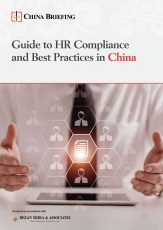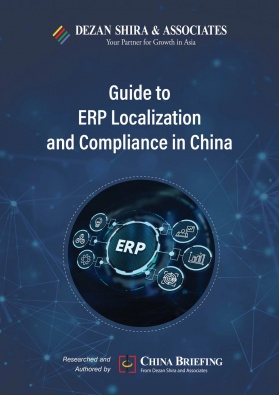Guide to HR Compliance and Best Practices in China
Guide to HR Compliance and Best Practices in China, the latest publication from China Briefing and Dezan Shira & Associates, is now available for download through the Asia Briefing Publication Store.
What’s in this guide
Operating a business in China has become increasingly complicated due to shifts in the economy, geopolitical factors, diversifying supply chains, and evolving regulatory frameworks governing taxation, data compliance, and other areas.
These changes, combined with a more focused implementation of human resources (HR) policies, underscore the critical importance of adhering to best practices in HR management and ensuring compliance with China’s labor laws when managing a company’s talents.
For companies that are newly set up—whether they are establishing a wholly foreign-owned enterprise, partnering with a local business, or simply registering a representative office—one critical aspect is securing local employees. Understanding effective recruitment and management practices, along with your legal responsibilities as an employer, is imperative. These steps not only enhance your competitive advantage but also facilitate strategic decision-making and solidify your foothold in China for the long term.
The Guide to HR Compliance and Best Practices in China, compiled by professionals at Dezan Shira & Associates in May 2024, introduces the fundamentals of HR management and labor compliance in China. Within its chapters, we delve into essential topics that businesses must understand and pay attention to as employers. Our primary focus includes insights into China’s changing labor market, the country’s labor law framework, and essential steps for achieving effective employment management and compliance in the context of new personal information protection and data privacy legislation. We also provide additional links in several sections that can be used to explore specific topics in more detail.
Employment management and HR compliance in China at a glance
Effective employment management and HR compliance are multifaceted challenges that demand expertise across various domains. Various key issues deserve specific attention by employers in China.
We list some of the key takeaways from respective sections of the Guide below:
- Hiring options: An enterprise can hire staff through three basic options—direct hiring, labor dispatch, and outsourcing. Professional employer organization (PEO) service is growing in popularity as an alternative hiring option.
- Representative offices: Representative offices, being one of the simplest foreign investment structures in China, face limitations when it comes to direct staff hiring. Instead, they must engage dispatch agencies. These agencies must hold a government-issued special license that allows them to hire employees on behalf of their clients (for instance, Dezan Shira & Associates holds such dispatch licenses).
- Dispatch limits: Labor dispatch can only apply to three types of positions—temporary position, auxiliary position, and replaceable position. The number of total dispatched employees used by an employer should not exceed 10 percent of its total number of employees.
- Mandatory written contracts: All directly hired employees must be given a written contract within one month of their start date. Failure to do so entitles the employee to double salary. Electronic labor contracts are regarded as written contracts as well by satisfying certain conditions.
- Probation period: The range of legitimate grounds for dismissing an employee is considerably wider during their probation period. The employer may also pay only 80 percent of the employee’s contractual salary during this time.
- Working hour system: In China, there are three main work hour systems—the standard work hour system, the comprehensive work hour system, and the non-fixed (flexible) work hour system. The latter two systems are considered ‘special work hour systems’, which require special approval and compliance requirements.
- Payment and tax: An employee’s salary package could include base salary, allowances, bonuses, non-monetary pension plans, and the employer’s portion of social security contribution. The base salary should be stipulated in the labor contract. Employers are required to file individual income tax (IIT) for their employees on a monthly basis.
- Mandatory social security: China’s social security system is made up of five different kinds of insurance—pension, medical, maternity, work-related injury, and unemployment, plus one housing fund. Both employer and employee are obligated to make contributions, but it is generally the employer’s responsibility to correctly calculate and withhold the payments for both parties. The employer’s obligation to make adequate and timely contributions cannot be relaxed or exempted even if there is mutual agreement with employees.
- Leave during the first year of employment: Employees are not entitled to any mandatory minimum number of leave days during the first year of their career, except public holidays, such as Chinese New Year around January-February and the National Day celebrations in early October.
- No at-will termination: Terminating employees in China is both difficult and expensive. While employees can resign with 30 days’ notice, employers face limited grounds for terminating an employee before their contract reaches its natural end.
- Non-fixed term contract after two fixed-term contracts: After an employee finishes their second contract with your company, he or she generally shall be offered a non-fixed term (permanent) contract as the third unless they want another fixed term contract instead. Such non-fixed term contracts can only be terminated if there are valid grounds for dismissal. Notably, some regions, such as Shanghai, offer more flexibility regarding this rule.
- Severance payments mandated by law: In practice, severance payments can be higher than the law prescribes, and can comprise a significant part of overall HR costs.
- Hiring foreign workers: China implements a tiered talent classification system for hiring foreign workers. Different classes of talents are subject to different administrations. Foreigners who want to work at companies in China should arrive on a valid work visa (Z-visa or R-visa). Employers need to obtain and renew Foreigner’s Work Permit and Residence Permit for their foreign staff in a timely manner.
- Tech-powered HR and payroll solutions: Companies are now transitioning from fragmented, localized payroll software or Excel spreadsheets to comprehensive, technology-driven HR management platforms. These platforms streamline various processes, including onboarding, attendance tracking, leave management, claims processing, and even talent management and training.
- Privacy and personal information protection: With the release of the Civil Code, the Personal Information Protection Law (PIPL), as well as the other relevant data security laws and regulations, employers in China are faced with a series of new compliance requirements in employment management. Companies need to audit their current policies and develop corresponding mechanisms to stay compliant.
Whether you’re a new entrant or an existing player, this guide equips you with the knowledge needed to navigate HR complexities in China. For personalized assistance, feel free to contact China@dezshira.com.
About Us
China Briefing is one of five regional Asia Briefing publications, supported by Dezan Shira & Associates. For a complimentary subscription to China Briefing’s content products, please click here.
Dezan Shira & Associates assists foreign investors into China and has done so since 1992 through offices in Beijing, Tianjin, Dalian, Qingdao, Shanghai, Hangzhou, Ningbo, Suzhou, Guangzhou, Haikou, Zhongshan, Shenzhen, and Hong Kong. We also have offices in Vietnam, Indonesia, Singapore, United States, Germany, Italy, India, and Dubai (UAE) and partner firms assisting foreign investors in The Philippines, Malaysia, Thailand, Bangladesh, and Australia. For assistance in China, please contact the firm at china@dezshira.com or visit our website at www.dezshira.com.
- Previous Article Occupazione femminile in Cina: progressi recenti e sfide in corso
- Next Article China Releases ESG Reporting Standards for Businesses


























